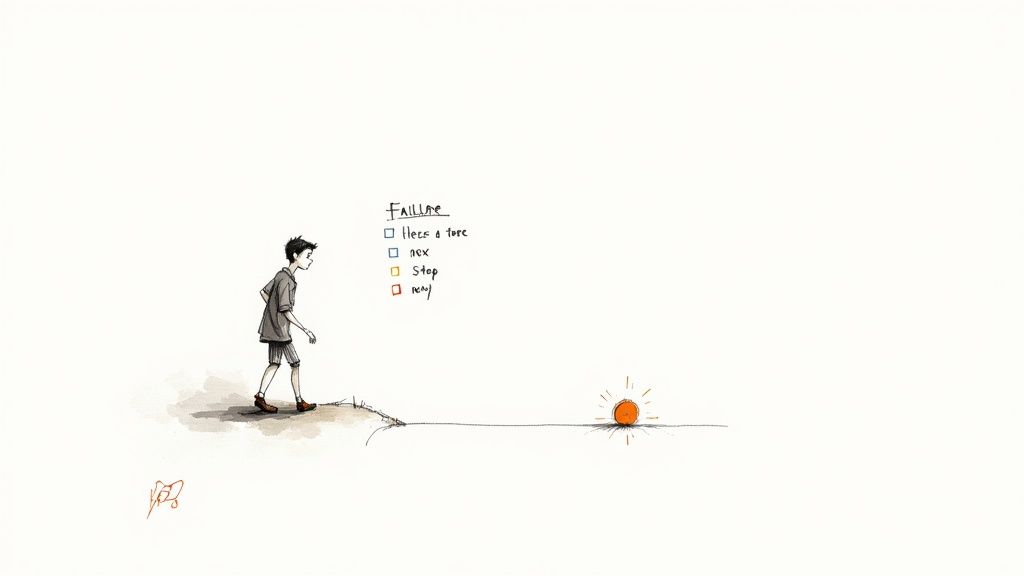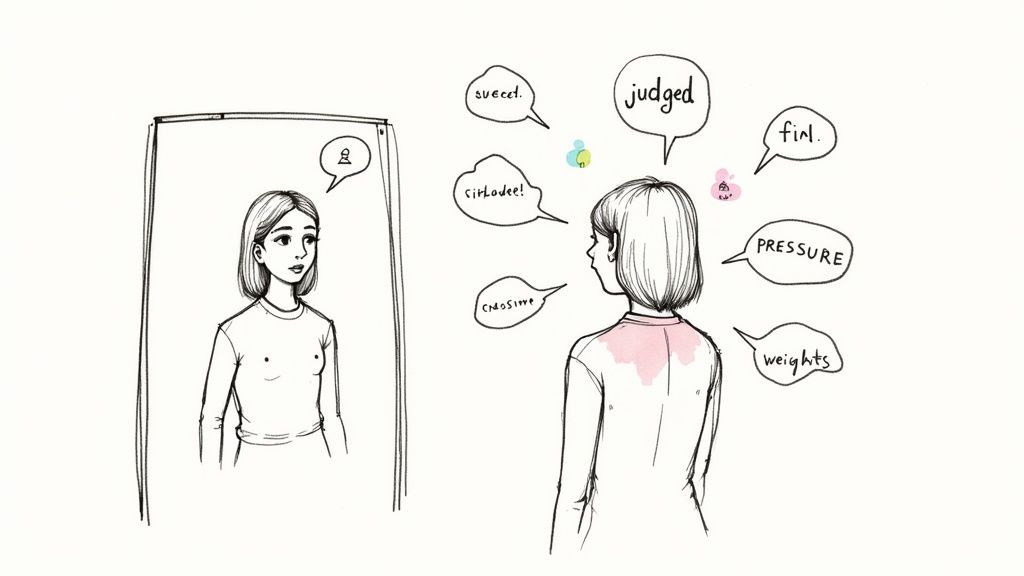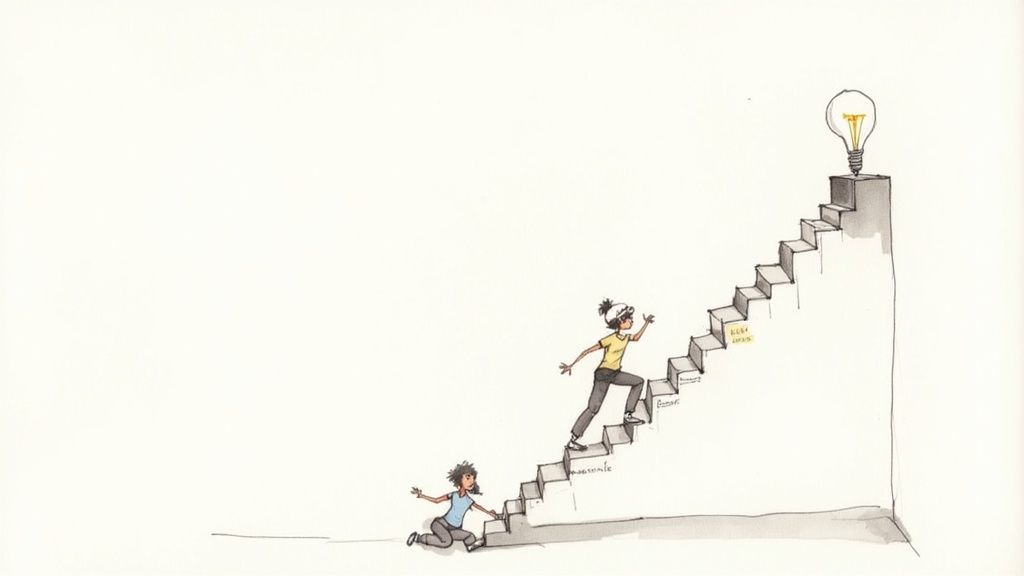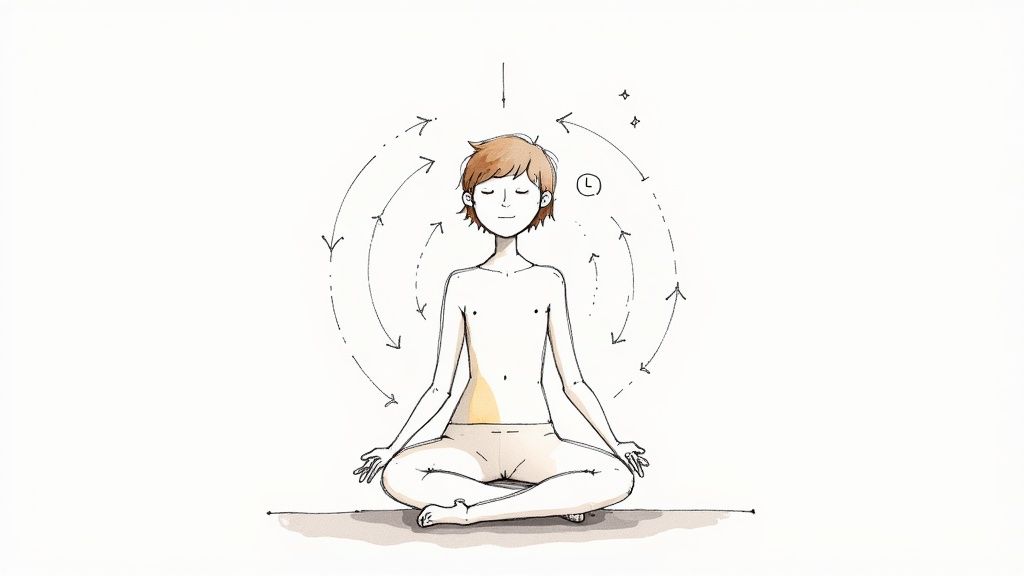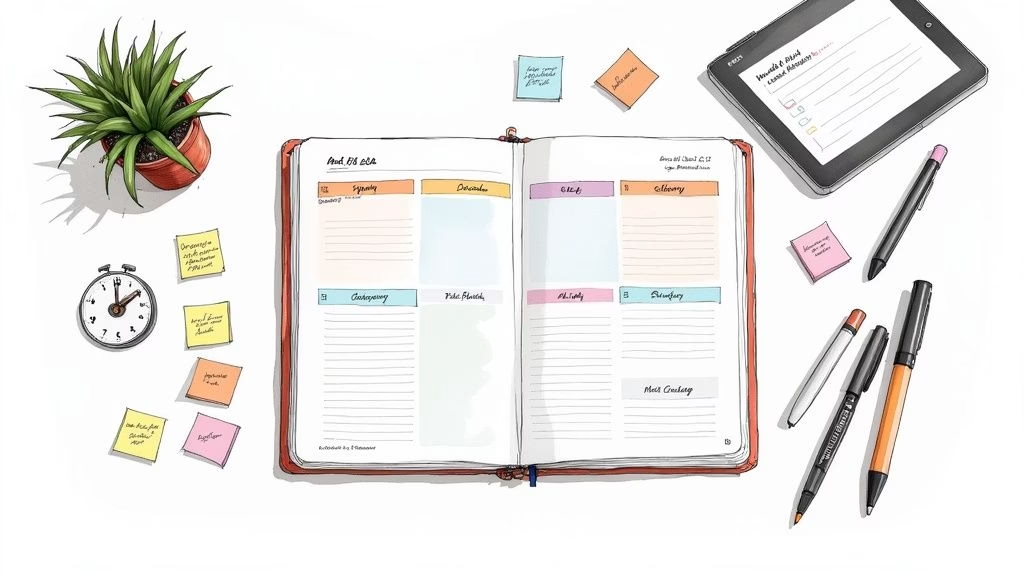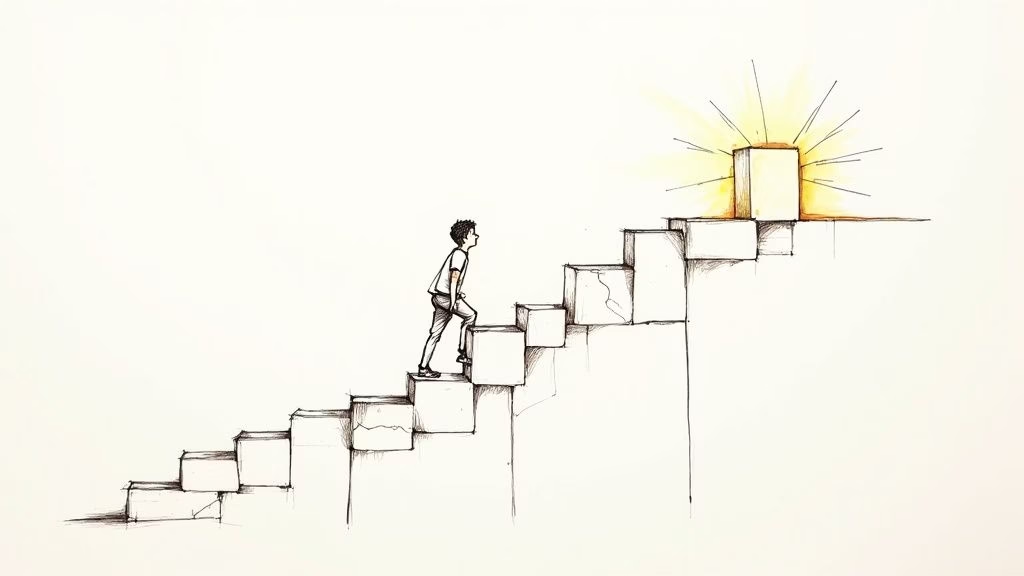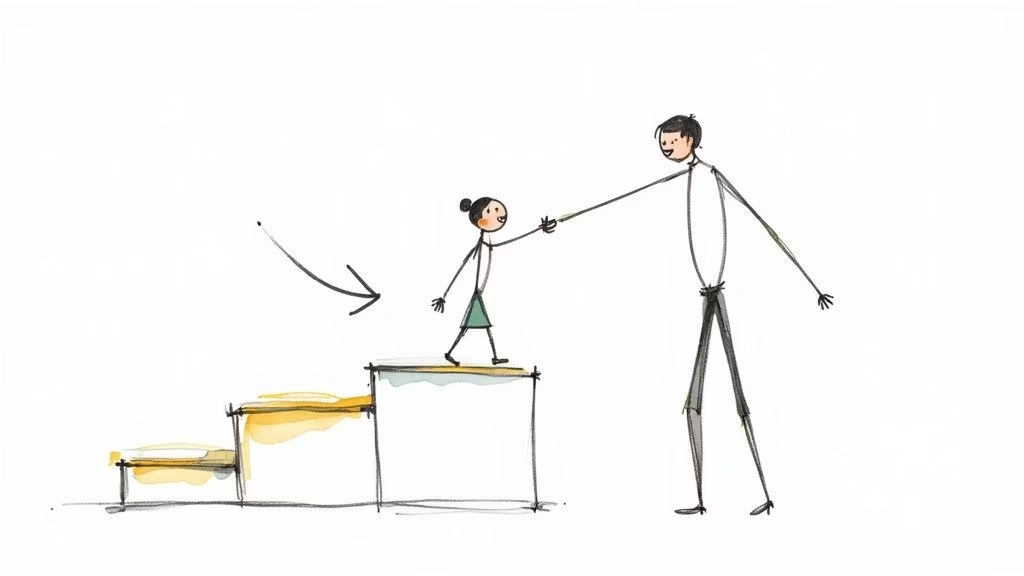Failing an exam or missing a huge goal can feel like hitting a brick wall. But learning how to pick yourself up is the first real step toward building resilience. The way forward isn't about ignoring the sting; it's about letting yourself feel it without judgment, figuring out what actually happened, and then finding one small thing you can do to get back on your feet.
This is how you turn a pretty painful moment into a powerful lesson.
Your First Steps for Navigating Failure
When you stumble, your first instinct is probably one of two things: jump right back up and pretend it didn't happen, or just give up completely. Both of those reactions skip the most important part—actually processing what went down.
Giving yourself the space to be disappointed, frustrated, or even just plain sad isn’t a sign of weakness. It’s a necessary part of building real emotional strength.
Acknowledge Your Feelings Without Judgment
The initial shock of a setback can unleash a flood of emotions. Instead of shoving them down or pretending you're fine, just sit with them for a bit. This isn't about wallowing; it's about being honest with yourself.
For young men especially, society heaps on the pressure to be stoic and "tough it out," which can make this step feel almost impossible. Finding a safe space to talk, whether it's with a mentor or a trusted group of friends, can make all the difference. Owning your emotions is the first real move toward taking back control.
Reflect and Reframe Your Perspective
Once that first emotional wave starts to calm down, it’s time to think. Instead of replaying the failure in your head, ask yourself what you can learn from it. For any teen struggling with school motivation, this shift is everything. It's how you break the cycle of procrastination that almost always follows a bad grade.
Try asking yourself a few honest questions:
- What specific things did I do that led to this?
- What was actually in my control, and what wasn't?
- If I could do it over, what would I do differently next time?
The point here isn't to beat yourself up or place blame. It's about gathering intel for your next attempt. A great place to start is by exploring a teen's perspective on growth and motivation.
A quick meditation can also help clear your head. Just find a quiet spot, close your eyes, and focus on your breathing for two minutes. Feel the air come in and go out. When your mind inevitably drifts back to the failure, just gently bring your focus back to your breath. It creates a small pocket of calm that makes honest reflection so much easier.
For parents, your role here is to offer support, not a quick fix. Validate what your teen is feeling with something simple like, “I can see how disappointing that must be.” Jumping in with solutions can make them feel like their emotions aren't valid. When you create a home where failure is just seen as part of the learning process, you help build resilience that lasts a lifetime.
To make this process more concrete, here are some core actions you can take right away.
Core Actions for Building Resilience
This table breaks down the essential steps to take after a setback, helping you see how each action contributes to building that inner strength.
| Action | Benefit |
|---|---|
| Allow Yourself to Feel | Validates your emotions and prevents them from getting bottled up, which is the first step toward emotional processing. |
| Talk It Out | Sharing with a trusted friend, parent, or mentor provides perspective and reminds you that you’re not alone. |
| Ask "What Can I Learn?" | Shifts your mindset from victim to student, turning a negative outcome into valuable data for the future. |
| Identify One Small Next Step | Re-establishes a sense of control and forward momentum, even if it's just organizing your desk or emailing a teacher. |
| Practice Self-Compassion | Reminds you that one failure doesn't define you. Treating yourself with kindness is crucial for bouncing back. |
Each of these steps, no matter how small, is a building block. They don't just help you get over one bad experience; they equip you with a toolkit for handling whatever life throws your way next.
Why Failure Feels So Intense for Teens
Let’s be real—failure hits differently when you’re a teen. Getting cut from the team or bombing a final doesn’t just sting; it can feel like a direct shot to your identity. Your sense of who you are is still being built, so it’s easy to mistake a single setback for a final verdict on your worth.
This isn’t just you being dramatic. The emotional fallout—shame, anxiety, the fear of what everyone else thinks—can feel massive. Your brain is literally wired for social connection, which makes the fear of letting people down incredibly powerful.
The Pressure Cooker of School and Motivation
At school, the stakes can feel impossibly high. A bad grade isn't just a number on a page; it feels like a door slamming shut on your future.
That pressure can kick off a nasty cycle. You start to fear failing again, and that fear becomes so paralyzing that you stop trying altogether. This procrastination is a classic motivation-killer that makes it ten times harder to show up for class or crack open a textbook for the next exam.
This is a quiet battle so many teens face, especially teen boys who often feel like they need to have it all together, all the time. Admitting you're struggling can feel like just another failure.
"Failure should be our teacher, not our undertaker. It is a temporary detour, not a dead end."
Internalizing this is everything. When you can see a setback as a "temporary detour," you can learn from it instead of letting it define you. It’s about separating what happened from who you are.
Where to Find Support When You Need It
When failure feels too heavy to carry on your own, reaching out is a sign of strength, not weakness. You don't have to figure this all out alone.
Here are a few places to start:
- For Teen Boys: Organizations like The Good Men Project or local community men's groups offer mentorship and a space where you can talk about challenges without judgment.
- Understand Your Brain: Reputable sources like the National Institute of Mental Health (NIMH) have tons of research on teen anxiety and depression. Understanding the science behind your feelings can be incredibly empowering.
- For Parents: You can build resilience in your kids by being open about your own setbacks. Instead of hiding disappointments, talk about them. Show them that failure is a normal part of life, not something to be ashamed of.
- Men's Groups: Many communities have support groups specifically for young men. They provide a safe zone to share what’s going on and learn coping strategies from guys who get it.
Building resilience is a skill, and it takes practice. For a little perspective, look at the business world. According to the U.S. Bureau of Labor Statistics, 21.5% of new businesses fail in their first year. By year ten, 65.1% have failed.
Those business failure rates prove that setbacks aren't just common—they're an expected part of any worthwhile journey.
Practical Ways to Turn Setbacks Into Strengths
Alright, let's talk about the shift from feeling stuck to feeling empowered. It's not about pretending a setback didn't happen. It's about actively changing how you think about it and what you do next. This is where you learn to handle failure in a way that actually makes you stronger.
I’ve seen it a thousand times: a bad grade hits, school motivation tanks, and suddenly procrastination feels like the only safe option. It’s a way to avoid that sting of disappointment again, but it just piles on more stress. Breaking that cycle starts with making the task feel less like a monster.
Don't stare at the whole mountain. Just focus on the first tiny step. Instead of thinking about the entire project, just open your textbook. Or write one single paragraph. That small action creates momentum, and suddenly you start to feel like you're back in control.
Reframing Your Failure Story
The story you tell yourself about your failure is everything. You can see it as a dead end, or you can see it as a detour that taught you something you desperately needed to know. Making that mental pivot is the core of building real resilience.
There's a beautiful Japanese practice that I think captures this perfectly—it involves embracing the philosophy of Kintsugi for healing and resilience. Instead of hiding the cracks in broken pottery, they are filled with gold lacquer, making the piece even more beautiful for having been broken. Your setbacks are those golden cracks. They're part of your unique story.
The goal isn’t to erase the failure, but to integrate its lessons. Ask yourself: "What did this experience teach me that I can use moving forward?" This simple question yanks your focus from the pain of the past to the potential of the future.
For Parents Supporting Their Teens
Your job as a parent is to be a guide, not a fixer. You can help your teen reframe their story by asking questions that spark reflection, not judgment.
Instead of, "Why did you wait so long to study?" try something like, "What could we do differently next time to feel more prepared?" This turns it into a team effort and helps develop problem-solving skills without piling on any shame.
This mindset is gold far beyond the classroom. Just look at the startup world, where failure is practically a rite of passage. The global startup failure rate hovers around 90%, often due to things like a bad market fit or weak marketing.
The entrepreneurs who make it aren't the ones who never fail. They're the ones who fail, analyze what went wrong, adapt, and go again. It’s living proof that learning from setbacks is a non-negotiable ingredient for success in any field.
How Parents Can Foster Teen Resilience
As a parent, you're one of the most powerful allies your teen has when it comes to learning how to deal with failure. Your home can be the safe harbor where disappointments are discussed openly, stripping away the shame that so often comes with a setback.
https://www.youtube.com/embed/avx4Ww9h3Tc
When your teen comes to you after a tough experience—a failed test, a missed shot, a friendship gone sour—the first instinct is often to fix it. But the real goal is to just listen.
Simple, validating phrases go a long way. Things like, “That sounds incredibly frustrating,” or “I can see why you’re so disappointed” create a space where it’s safe to be vulnerable. This approach doesn't just make them feel heard; it helps build their emotional intelligence and shows them their feelings are valid.
Model How You Want Them to Cope
One of the most effective things you can do is model the behavior you want to see. It’s that simple. When you face your own setbacks—at work, in a personal project, anywhere—talk about it.
Don't hide it. Share what went wrong, what you learned from it, and how you’re planning to move forward. This simple act normalizes failure as a part of life, not some catastrophe to be ashamed of.
This perspective is crucial. We know from real-world data that failure is an expected part of any ambitious journey. For instance, by year five, almost 49.4% of new businesses have failed, and that number climbs to 65.3% by the ten-year mark. Framing setbacks as common and, more importantly, survivable can profoundly shift a teen's outlook. For more on this, check out these business resilience strategies on commerceinstitute.com.
Practical Resources and Support, Especially for Young Men
Teen boys, in particular, often feel immense pressure to appear strong and self-reliant all the time. It's vital to give them resources and safe spaces where they feel they can open up without judgment.
- Men's Groups: Organizations like The Good Men Project offer articles and forums that challenge traditional ideas of masculinity and encourage emotional expression.
- Mentorship: Connecting a young man with a trusted mentor can give him a valuable outlet outside the immediate family to talk through challenges.
- Mental Health Info: Credible sources like the National Institute of Mental Health (NIMH) provide solid information on teen mental health, helping families spot the signs of anxiety and depression.
The most impactful thing a parent can do is reinforce that a person’s worth is not tied to their achievements. Failure is an event, not an identity. This distinction is the foundation of lasting self-esteem.
Ultimately, your role isn't to be a fixer, but a supportive guide. By fostering open communication and providing the right resources, you're actively building resilience in teens—a skill that will serve them for the rest of their lives.
A Mindfulness Guide for Teens to Manage Stress
After a setback, it can feel like your brain is juggling too many tabs—ruminating over mistakes, worrying about what’s next, and racing through “what ifs.” Mindfulness offers a simple way to close a few of those tabs and find a moment of calm.
It isn’t about emptying your mind. Instead, you learn to focus on the present moment without judgment. That shift alone can clear space for fresh perspectives when school stress or looming deadlines start to pile up.
A Simple Meditation Guide For Teens
You don’t need a quiet studio or special gear. These quick practices work at your desk before an exam or on your bed when the pressure mounts.
-
Find Your Breath
Settle into a comfortable position. Close your eyes and observe each inhale and exhale. Let the breath be exactly as it is—no forcing. -
Anchor Your Attention
Notice the sensation of air at your nostrils or the gentle rise and fall of your chest. This physical cue keeps you grounded in the here and now. -
Gently Return
Your mind will drift—that’s normal. When it does, simply note where it went and guide your focus back to breathing. Each return builds your “focus muscle.”
Even three minutes of this can dial down stress and restore your sense of control. When parents join in, it opens up conversations about healthy coping and resilience.
Mindfulness isn’t about making thoughts disappear. It’s about changing your relationship with them so they don’t have power over you.
Resources For Deeper Practice
If you’d like more support, these tools and communities can help you dive in:
-
Guided Meditation Apps
Explore Calm or Headspace for teen-friendly sessions on focus, anxiety relief, and sleep. -
Evidence-Based Insights
The National Institute of Mental Health offers research-backed tips on teen mental health and stress management. -
Peer Support Networks
Local men’s groups or mentorship circles provide a safe space to share setbacks, celebrate progress, and build lasting resilience.
By weaving mindfulness into daily life and leaning on supportive networks, setbacks become stepping stones rather than stumbling blocks.
Finding Support and Resources for Young Men
Let's be real—young men often get hit with this unspoken pressure to have it all figured out. Be strong, be stoic, be successful, and whatever you do, don't show the struggle. Learning how to handle failure is hard for anyone, but it feels ten times harder when you think asking for help makes you weak.
But building a support network isn't a weakness. It's actually a power move—a strategic choice for building real, long-term strength. Reaching out isn't giving up; it's taking action. It’s about finding people who can give you perspective when your own is clouded by disappointment.
Building Your Support System
Figuring out who to talk to can feel like a mission in itself, but there are spaces designed specifically to help young men navigate this stuff. And this isn't just about crisis moments; it's about building the muscle of resilience day in and day out.
-
Connect With Guys Who Get It
There's something incredibly powerful about talking to other guys who understand the pressure. Organizations like The Man Cave and other local men's groups create a space where you can actually have honest conversations without worrying about judgment. They focus on what healthy masculinity and emotional intelligence really look like. -
Tap Into Professional Resources
Sometimes you need an expert guide, and that's perfectly fine. Websites from the National Institute of Mental Health (NIMH) offer solid, research-backed info on mental health challenges that are common for men. For moments when you need immediate help, hotlines like the 988 Suicide & Crisis Lifeline are there for you 24/7. -
Talk to Your Parents
Parents can be an incredible resource if they help create a space for open dialogue. Instead of jumping to fix the problem, a simple, open-ended question like, "How are you feeling about that?" can make all the difference. It's an invitation to process, not just report.
Your worth isn't tied to a grade, a game, or a single outcome. A solid support system is a constant reminder that failure is an event, not your identity.
A Quick Mental Reset
When a setback kills your motivation, your mind can feel like a mess of tangled thoughts. A super simple meditation can help you hit the reset button.
Find a quiet spot and just sit for three minutes. Close your eyes and bring all your attention to your breath—the feeling of it coming in and going out. Your mind is going to wander. It'll jump to thoughts about what went wrong or what you have to do next. That's totally normal.
Each time it happens, just gently guide your focus back to your breath. This small act is like a workout for your brain. It builds mental discipline and carves out a pocket of calm, making it way easier to see a path forward.
Questions That Come Up After a Setback
When you hit a wall, it’s completely normal for a million questions to start swirling in your head. It's a sign that you're trying to figure out how to get back up. Here are a few common ones I hear from teens and young adults, along with some real-world advice to help you move forward.
How Can I Stop Procrastinating After I’ve Already Messed Up?
Procrastination after a failure is almost always about self-protection. Your brain is trying to shield you from feeling that sting of disappointment again, and its go-to strategy is avoidance.
The trick is to make the next step feel so small it’s almost impossible not to do. Forget the entire mountain you have to climb. Just focus on one tiny, non-threatening task. Can you open the textbook? Can you write a single sentence? That’s it.
Then, you have to reward the effort, not just the final outcome. When you complete that tiny task, give yourself a mental high-five. This starts to retrain your brain, linking action with a small win instead of a big fear. Slowly but surely, you'll rebuild your motivation for school and whatever else is in front of you.
What if My Parents Just Don’t Get It?
This is a tough one. It’s incredibly frustrating when it feels like your parents don't understand the weight of what you're going through.
One of the best things you can try is shifting your language. Instead of saying, "You don't get it," which can sound like an attack, try framing it with "I" statements. For example, "I feel really misunderstood when we talk about this." It's less confrontational and gives them a window into your perspective instead of just a wall to argue with.
If that doesn't bridge the gap, it's time to expand your support system. A school counselor, a trusted coach, or a mentor can give you the validation you're not getting at home. For young men in particular, finding men’s groups can be a game-changer, offering a space to talk with guys who understand the specific pressures you’re facing.
Remember, it's okay if your parents aren't your only source of support. Building a diverse network of trusted adults is a sign of maturity and a crucial part of becoming resilient.
Can Mindfulness Actually Help With All This School Anxiety?
Absolutely. Mindfulness isn't some mystical practice—it's a practical tool, and the research backs it up for reducing stress and sharpening focus.
When you're anxious about school, your thoughts tend to spiral out of control. Mindfulness, even something as simple as following a short meditation guide for teens, anchors you in the present moment. Just focusing on your breath for two minutes can interrupt that cycle of worry about past mistakes or future tests.
It gives your brain a much-needed break, allowing you to approach your schoolwork with a calmer, clearer head.
At Andrew Petrillo Life Coaching, we give teens the tools to build real resilience, manage academic stress, and navigate life’s challenges with confidence. Book a complimentary discovery call today to see how one-on-one coaching can help you turn setbacks into your greatest strengths.

